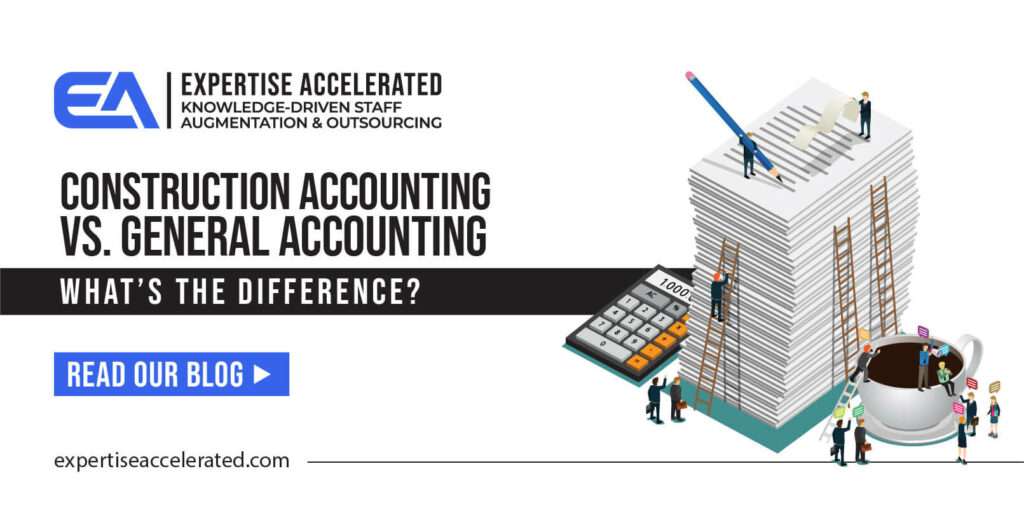Streamline Your Business Finances with Professional Construction Accounting Services
Streamline Your Business Finances with Professional Construction Accounting Services
Blog Article
Recognizing the Relevance of Building Audit for Successful Project Administration

Duty of Construction Accountancy
Building and construction bookkeeping acts as the backbone of financial management in the building market, making sure that jobs are finished within budget plan and economic purposes are fulfilled. construction accounting. This customized audit strategy addresses the unique challenges faced in construction projects, consisting of differing task periods, changing expenses, and several stakeholders
One of the primary functions of construction accountancy is to give exact expense evaluation and tracking throughout the job lifecycle. This facilitates educated decision-making, making it possible for job managers to adjust timelines and sources efficiently. Furthermore, building bookkeeping enhances capital administration by keeping an eye on accounts payable and receivable, thus making certain that funds are readily available for timely payments to subcontractors and distributors.
It equips task managers with the necessary financial data to prepare detailed monetary statements, which are essential for audits and monetary testimonials. Ultimately, the role of building audit extends beyond simple economic monitoring; it is integral to tactical planning and operational effectiveness, driving the success of building tasks in an affordable landscape.
Trick Elements of Construction Bookkeeping

Budgeting establishes a financial structure that guides project implementation, enabling supervisors to designate resources efficiently and expect prospective monetary challenges. Exact expense monitoring is necessary for surveillance expenses in real-time, helping to recognize variations between predicted and actual prices. This allows timely modifications to keep the job on budget.
In addition, monetary coverage provides stakeholders with a clear image of the project's monetary health. Routine records, such as revenue and loss declarations and cash circulation evaluations, promote informed decision-making and improve openness among all celebrations entailed.
Additionally, conformity with sector regulations and accountancy criteria is vital. This ensures that monetary techniques are not only efficient yet also legal, securing the company against legal repercussions. By integrating these vital components, building audit fosters a structured technique to taking care of funds, eventually adding to the successful completion of construction projects.
Benefits for Job Managers
Leveraging effective construction audit practices provides project supervisors with a plethora of advantages that boost both functional effectiveness and financial oversight. One significant benefit is boosted spending plan administration. Precise tracking of earnings and costs enables project supervisors to check economic performance in real time, guaranteeing projects continue to be within budget plan and helping with timely changes when needed.
Moreover, building accounting streamlines capital administration, making it possible for job managers to expect economic demands and maximize source allowance. By recognizing cash inflows and outflows, they can better handle settlements to workers, providers, and subcontractors, thereby staying clear of expensive hold-ups.
Additionally, robust accounting systems give detailed reporting capacities. Project managers can create reports that use understandings into job productivity, cost variations, and source utilization. This data-driven technique cultivates informed decision-making, enabling supervisors to recognize potential issues proactively and carry out rehabilitative measures.
Lastly, adherence to building and construction accounting standards guarantees conformity with regulatory and legal requirements, lessening the click to find out more danger of disputes or penalties. In general, efficient building accountancy outfits task supervisors with the devices essential to drive task success, enhance stakeholder confidence, and advertise lasting business development.
Usual Obstacles in Building And Construction Audit
Several task supervisors come across substantial obstacles in building accountancy that can impede job success. One of the primary difficulties is the complexity of tracking multiple job websites, each with distinctive budget plans, timelines, and resource allotments. This needs precise attention to information, which can be overwhelming without a robust accounting system in location.
In addition, fluctuating product expenses and labor rates can complicate spending plan monitoring, making precise forecasting hard. Job supervisors often battle to resolve these expenses with real expenses, resulting in potential economic inconsistencies.
Moreover, building and construction accountancy involves conformity with different regulations, consisting of tax commitments and labor legislations. Navigating these policies can be difficult, particularly for supervisors who might not have a strong accountancy background.
An additional considerable obstacle is handling cash money view website flow, which is essential in the building industry. Hold-ups in invoicing, payments from customers, or unexpected job changes can produce cash money flow scarcities, jeopardizing the project's progression.
Lastly, reliable communication in between project supervisors, accountants, and field groups is vital. Misconceptions can lead to unreliable financial coverage, even more making complex project administration initiatives. Addressing these difficulties proactively is essential for successful building bookkeeping.

Ideal Practices for Effective Audit
While browsing the intricacies of building and construction audit can be daunting, adopting ideal techniques can dramatically boost economic administration and job success. One essential practice is maintaining timely and accurate records. Applying durable accountancy software application tailored to building and construction jobs can enhance data access, invoicing, and coverage, decreasing errors and conserving time.
In addition, developing a clear budget and normal tracking against this budget are essential. Using a system of regular financial testimonials enables project supervisors to recognize variances early, facilitating prompt decision-making. It is also essential to different project prices into indirect and direct categories, allowing more clear insights into success.
One more ideal method entails promoting open interaction among all stakeholders. Routine updates and collaborative discussions concerning financial standing can ensure everybody is straightened and informed. Educating team in construction-specific bookkeeping concepts further improves expertise and accuracy.
Finally, making certain compliance with appropriate audit standards and policies is non-negotiable. Normal audits and inner reviews contribute to openness and accountability, constructing trust with stakeholders and customers. By concentrating on these ideal practices, building firms can enhance their audit procedures, ultimately driving project success and monetary stability.
Final Thought
To conclude, building and construction accounting plays a critical function in making sure effective job monitoring by promoting exact economic oversight and boosting decision-making. By incorporating key components such as cost estimation, capital administration, and conformity, job supervisors can navigate typical difficulties and leverage best methods for efficient bookkeeping. Eventually, a robust construction accounting structure not just safeguards spending plan honesty however likewise contributes to the overall financial health of building and construction tasks, promoting sustainable success within the industry.
By incorporating these crucial elements, building bookkeeping fosters an organized technique to handling financial sources, eventually contributing to the effective conclusion of construction projects.
Exact tracking of earnings and costs enables project supervisors to check monetary i was reading this performance in actual time, making sure projects continue to be within budget plan and facilitating prompt modifications when required.
Project supervisors can generate records that use insights right into job success, cost differences, and source usage.Many task managers encounter considerable challenges in building and construction bookkeeping that can prevent project success. construction accounting. Ultimately, a durable construction accountancy framework not only safeguards spending plan integrity however also contributes to the total monetary wellness of construction jobs, fostering lasting success within the industry
Report this page